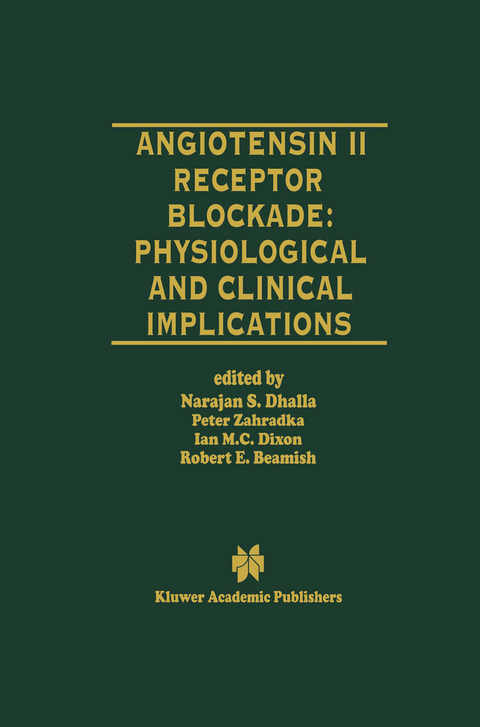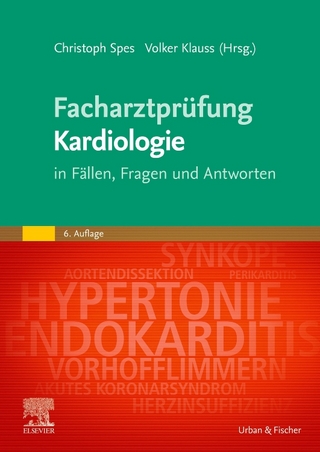
Angiotensin II Receptor Blockade Physiological and Clinical Implications
Springer-Verlag New York Inc.
978-1-4613-7631-6 (ISBN)
A. Pharmacological Interruption of Renin-Angiotensin in Hypertension.- 1. Pharmacological Interruption of the Renin System and the Kidney: Lessons from Comparative Pharmacology.- 2. The Brain Renin-Angiotensin System and Salt-Sensitive Hypertension.- 3. At1 Angiotensin Receptor Blockade and Angiotensin-Converting Enzyme Inhibition: Effects on Vascular Remodeling and Endothelial Dysfunction in SHR.- 4. Cellular Physiology of Angiotensin II Receptors in Vascular Smooth Muscle Cells.- 5. Angiotensin II Enhanced the Expression of Inhibitory Guanine Nucleotide Regulatory Protein in Vascular Smooth Muscle Cells: Blockade by AT1 Antagonist.- 6. Comparison of the Inhibitory Actions of Angiotensin AT1 Receptor Antagonists in the Peripheral Vascular Bed.- 7. Angiotensin II Receptor Antagonists in Patients with Renal Failure and on Hemodialysis.- 8. The Place of Angiotensin II Antagonists in Relation to the Canadian Hypertension Society Guidelines.- 9. Translating Clinical Guidelines for Management of Heart Failure and Hypertension into Clinical Practice.- 10. Cough Induced by Pharmacological Modulation of the Renin-Angiotensin-Aldosterone System. Angiotensin-Converting Enzyme Inhibitors and Angiotensin II Receptor Antagonists.- B. Angiotensin Blockade and Cardiovascular Disease.- 11. Angiotensin II Receptors AT1 and AT2: New Mechanisms of Signaling and Antagonistic Effects of AT1 and AT2.- 12. Angiotensin Receptor Antagonists and Cardiovascular Remodeling.- 13. Intersubject Variability in the Pharmacokinetics of Losartan.- 14. Functional Analysis of Tissue Renin-Angiotensin System Using “Gain and Loss of Function” Approaches: In vivo Test of in vitro Hypothesis.- 15. Exploring the Difference Between Angiotensin-Converting Enzyme Inhibitors and Angiotensin II ReceptorAntagonists. A Focus on Bradykinin.- 16. Role of Cytokines in Septic Cardiomyopathy.- 17. In Pursuit of Optimal Care and Outcomes for Patients with Congestive Heart Failure: Insights from the Past Decade.- 18. Atherosclerosis: Implications of Angiotensin II and the AT-1 Receptor.- 19. Influence of AT1 Receptor Inhibition on Cardiac Function and Structure of Diabetic Rats.- 20. Role of Myocardial Tissue Angiotensin (Ang.) II in Cardiac Pathology.- C. Angiotensin Blockade and Cardiac Hypertrophy and Heart Failure.- 21. Mechanical Stress, Local Renin-Angiotensin System and Cardiac Hypertrophy. An Overview.- 22. Role of Renin-Angiotensin System in Cardiac Hypertrophy and Failure.- 23. Effect of Angiotensin-Converting Enzyme Inhibition and of Angiotensin II Receptor Blockade on the Development of Cardiac Hypertrophy in Rats.- 24. Effects of Inhibition of Angiotensin-Converting Enzyme on Myocardial and Myocyte Remodeling in Chronic Volume Overload-Induced Cardiac Hypertrophy in the Dog.- 25. The Site of Angiotensin Generation: Focus on the Heart.- 26. Angiotensin II-Mediated STAT Signal Transduction: Studies in Neonatal Rat Cardiac Fibroblasts and CHO-K1 Cells Expressing At1A Receptors.- 27. Cardiac Angiotensin II Subtype 2 Receptor Signal Transduction Pathways: Embryonic Cardiomyocytes and Human Heart.- 28. Angiotensin II Stimulates Contractility and C-fos Gene Expression in Isolated Atrial Human Myocardium.- 29. Stimulation of the Na+/Ca2+ Exchanger by Angiotensin II.- 30. Developmental Regulation of the Cardiac Renin-Angiotensin System: Expression and Association with Growth and Apoptosis.- 31. Angiotensin II-Regulated Apoptosis in Cardiovascular Remodeling.- 32. The Role of Angiotensin II in Stretch-Activated Signal Transduction of the Normal, Hypertrophied, and FailingAdult Heart.- D. Angiotensin Blockade And Remodeling Of Heart In Myocardial Infarction.- 33. Role of Angiotensin II Receptor Blockade During Remodeling After Myocardial Infarction.- 34. Local Angiotensin II and Tissue Repair Post-Myocardial Infarction.- 35. Losartan Pretreatment Inhibits an Early Activation of Matrix Metalloproteinases in Acute Myocardial Infarction.- 36. The Role of Angiotensin II in Post-Translational Regulation of Fibrillar Collagens in Fibrosed and Failing Rat Heart.- 37. Characteristics and Mechanisms of Angiotensin II-Related Myocardial Damage.- 38. Comparison of Direct Angiotensin II Receptor Blockade with Converting Enzyme Inhibition in the Rat Model of Heart Failure.- 39. Effects of Captopril on Myocardial Oxidative Stress Changes in Post-MI Rats.- 40. Role of Angiotensin in Angiogenesis and Cardiac Fibrosis in Heart Failure.- 41. Role of Angiotensin II in Myocardial Ischemia/Reperfusion Injury.- 42. Effects of Angiotensin II Receptor Antagonist on Cardiac Remodeling in Cardiomyopathic Hamster Hearts.
| Reihe/Serie | Progress in Experimental Cardiology ; 2 |
|---|---|
| Zusatzinfo | XLIII, 588 p. |
| Verlagsort | New York, NY |
| Sprache | englisch |
| Maße | 155 x 235 mm |
| Themenwelt | Medizinische Fachgebiete ► Innere Medizin ► Kardiologie / Angiologie |
| ISBN-10 | 1-4613-7631-9 / 1461376319 |
| ISBN-13 | 978-1-4613-7631-6 / 9781461376316 |
| Zustand | Neuware |
| Haben Sie eine Frage zum Produkt? |
aus dem Bereich


